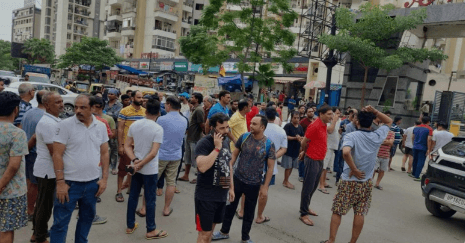In a display of civic activism, approximately 200 residents of Greater Noida staged a protest outside the Greater Noida Industrial Development Authority (GNIDA) office on Thursday. The demonstration was primarily driven by concerns over a 10% annual increase in water charges and proposed fees for door-to-door garbage collection, alongside other civic issues.
Members of around 52 Resident Welfare Associations (RWAs), united under the Federation of RWAs of Greater Noida (FRWAGN), gathered outside the GNIDA office around 10:15 am. Equipped with placards and slogans, the protesters voiced their discontent for over an hour. Their primary grievances centred on the perceived unjustified increase in water charges and the introduction of new garbage collection fees. A delegation from FRWAGN attempted to engage with GNIDA CEO Ravi Kumar NG but was unable to secure a meeting. Instead, OSD Himanshu Verma met with the protestors and received a memorandum detailing the various concerns. Verma assured the protesters that the issues would be presented to the CEO and addressed accordingly.
An official from FRWAGN, expressed the federation’s expectation for a resolution within the next 15 days. He warned of a potential indefinite dharna (sit-in protest) at the GNIDA office if their demands were not met. The federation’s demands highlight the dissatisfaction with both water infrastructure and waste management services in the region. A central issue is the 10% annual increase in water charges, which residents argue is unfair given the ongoing problems with water supply. Despite paying for water services, Greater Noida continues to experience frequent pipeline leakages and a lack of adequate Ganga water supply, exacerbating the residents’ frustration. The proposed door-to-door garbage collection charges have also sparked significant opposition. Residents argue that these additional fees are unjust, particularly since they have already paid substantial lease rents to GNIDA. They contend that the city’s infrastructure and waste management should be adequately developed without imposing further financial burdens on residents.
The protest underscores the broader discontent with the perceived inefficacy of local governance and development initiatives. The residents argue that political contractors and officials are colluding, resulting in inadequate progress and maintenance within the city. The call for action reflects a broader demand for improved service delivery and transparency from GNIDA.


